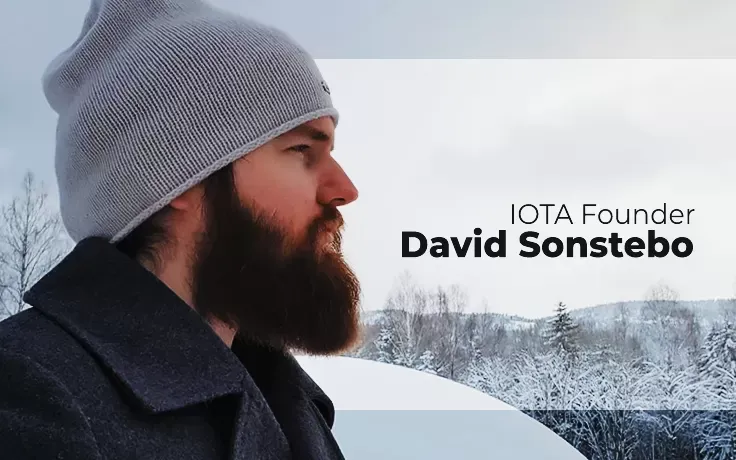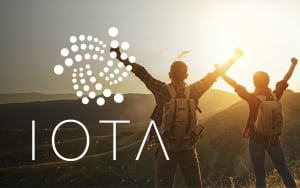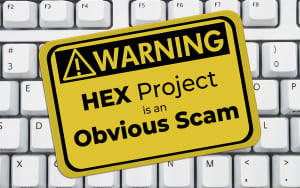
IOTA is one of the first companies that comes to my mind when I’m thinking of far from speculations and pure technology-oriented projects. They made some big announcements in the past year, including a partnership with Jaguar Land Rover to improve city organizations, helping to keep the roadways safe and reduce accidents; work on the Powerhouse building in Trondheim, the world’s northernmost energy-positive building; a collaboration with the Linux Foundation and Dell Technologies to work together on Project Alvarium, and many other news.
I spoke with their founder, David Sonstebo, and he told me about the Tangle, IOTA’s underlying data structure, the biggest plans for the foundation, and why the classic blockchains soon will be left far behind.
U.Today: Hello David, thank you for your time. It’s such a great opportunity to have a chance to speak with you. Can you tell me how the idea of creating IOTA was born?
David Sonstebo: Yeah, sure. This actually goes all the way back to 2013-2014. I personally joined the blockchain space in 2012 and, in 2013, I met up with Sergey Ivancheglo.
He was the guy that first invented and implemented the full Proof of Stake, the consensus mechanism that a lot of prominent projects have since adopted. Back then, we realized that the computer hardware paradigm had to shift. This is now known as the “More than Moore” strategy in the semiconductor industry in order to accommodate spearheading innovations in DLT, AI, VR/AR and intrinsic hardware security. This is why we were also the first and only DLT to take the threat of Quantum Computing seriously all those years ago. The primary goal of this initial initiative was to develop specialized hardware for the future by combining Distributed Ledger Technology and the Internet of Things. Our insight was that Moore’s Law is exhausted, but the demand for computation keeps increasing. Our philosophy was simple: hardware always follows software. From that hardware project, the Tangle emerged as a protocol to enable the true vision of a Machine Economy. The reason we realized that we had to create a whole new distributed ledger architecture was that regular blockchain architecture is simply not scaled for the billions of devices that the Internet of Things currently consists of. And, especially in the future, given we will continue to see this proliferation increase into the hundreds of billions. With this in mind, I broadened the project with two other co-founders.
Serguei Popov who was (and is) a brilliant mathematician and early DLT researcher, and Dominik Schiener, who was a young entrepreneur with common interests, just getting started, that I saw potential in, and thus decided to help out and team up with. I brought in Serguei Popov because he had already tinkered with different consensus mechanisms and different architectures you could say. He had this idea of using a directed acyclic graph instead of a sequential chain of blocks. We took some of those early ideas, applied some of our own ideas, and meshed it together. The outcome was the IOTA Tangle.

David Sonstebo. Image by IOTA
U.Today: Can you provide us with more details about this platform? How is the Tangle different from other blockchains?
David Sonstebo: Yeah, of course, the main differentiator is that it's not a blockchain. It's still a decentralised distributed ledger. But, by getting rid of both the chain and the blocks, we also got rid of the main bottlenecks of the blockchain. To explain it as simple as possible: in blockchain, you have two users; the miners to validate transactions and the actual users that are sending transactions. In the blockchain architecture, the incentives of these two user groups are fundamentally, diametrically opposed because the miners only care about the number of fees they can collect and the block rewards. They will always prioritize the transactions with the highest fee. So it becomes this supply and demand economy because there is a finite size in the block that dictates how many transactions you can actually put into each block. This situation creates a bottleneck as we've seen many times over the last few years, especially during 2017.
But, by getting rid of both the chain and the blocks, we also got rid of the main bottlenecks of the blockchain.
The Tangle, on the other hand, makes the user and the validator one and the same. When you issue a transaction in the IOTA network, you also validate two other previous transactions in the network. Naturally, every participant is doing the same thing. Every single participant is also a validator. What we essentially did and how we differentiate from blockchain is that instead of divorcing validation from the usage of the network, we made validation an intrinsic property over using the network. We got rid of the bottleneck in scaling because there are no longer any limitations on how many transactions can go into the network at once. We also got rid of fees because since the validator and the user are one, there is no one to compensate. You could just call it an intrinsic part of the protocol that if you want to use it, you also have to validate. That solves fees and scales as well as centralisation. Even though blockchain is always touted as this kind of the epitome of decentralisation, in reality, we all know that is not totally true. If you look at Bitcoin or Ethereum for instance, where is the validation happening? Most of it is happening in China in these big mining farms. So while people like to pretend the blockchain is decentralised, it really isn't because you have this incentive to pool, to get resources, to get the fees and the mining rewards. With IOTA, there are no such things as fees or mining rewards. There is no incentive to centralize. Every single participant is a validator so we can say the whole process becomes completely decentralised. The process of actually validating the ledger.
U.Today: What are your main competitors in the crypto world in your opinion?
David Sonstebo: That's a good question. Since I've been around in this space, I don't tend to think of other projects as competition per se. The IOTA project itself is a non-profit foundation. Everything we are doing is open source. When I see a potentially interesting white paper or an interesting project, I see it more as inspiration. If we consider the current live networks, I don't see any of them that could rival IOTA because all of them are still stuck in that old blockchain paradigm with miners, bottlenecks, and fees. I just can't imagine that they will be relevant 10 years from now. This may sound a bit too promotional, but the reason I’m saying all this is that these projects could recognize and some of them have already started to recognize the benefits of the IOTA approach. However, there is no way for most of the projects to ever pivot to IOTA’s approach since that could mean convincing the miners to fork over to a model where the miners no longer have an income. And at the end of the day, the miners decide which fork is relevant. It would be like trying to convince a company that you're now going to give away a product instead of selling them. It would be a hard sell.
U.Today: Recently you asked your community to share ideas on developing the IOTA protocol for climate change. Can you tell us more about this project?
David Sonstebo: Yeah, so this is the climate change project, which is funded by a collaboration with the European Institute for Technology (EIT) and EIT Climate KIC, the leading bodies of the European Union. At the IOTA foundation, we see a lot of interesting potential synergies with DLT and how to combat climate change. It could be either through incentivizing good behaviour, so to speak, so you see fewer carbon emissions, or through your car or whatever, incentivizing this emission in real-time via microtransactions over the Tangle. You could pay literally 0.001 cents if you want for behaviour that is good, or for instance, incentivizing collection of trash. There are several projects in our ecosystem precisely focused on getting rid of pollution. In that scope, you could also issue carbon credits, which would be immutable on top of the ledger. There's plenty of these initiatives that we see as a synergy.
If we consider the current live networks, I don't see any of them that could rival IOTA because all of them are still stuck in that old blockchain paradigm with miners, bottlenecks, and fees. I just can't imagine that they will be relevant 10 years from now.
Equally important, is the fact that you can tamper-proof the data coming from the sensors. Given the fact that there are increasing regulations on companies as well as countries to live up to the goals that they have signed up for, they have a lot of incentive to tamper with the data of the sensors that are monitoring how much emissions they are releasing, etc. Through the Tangle, you could ensure that the data you get from those sensors could never be changed and, therefore, you can hold them accountable. These are some examples of ideas. We've opened up this project to the broader community. Not just the DLT community, but also climate change activists. We believe this project will continue to evolve and blossom into something that goes way beyond the proof of concept and actually is implemented in the real world.
U.Today: That's really great. What was the last biggest news piece within the IOTA community? Can you tell us about it?
David Sonstebo: Yes, that's probably the hardest question because in IOTA over the last six months, we essentially release news all the time. Even just today, we've had several big announcements, we just literally 30 minutes ago released the complete roadmap of the future development and current development of the entire IOTA project. We also released an integration with a payment process called Moonpay. You can acquire IOTA directly in the wallet. And, just a few days ago, we had a big announcement regarding this project, here in Norway where I'm from, with all the biggest agricultural companies in Norway. This is a collaboration to create a secure audit trail of data in the agricultural sector and supply chain. One big piece of news is very hard to say because it all depends on how you weigh it. There is a ton of stuff cooking every single day in IOTA.

David Sonstebo. Image by IOTA
U.Today: What was the main thing for you personally?
David Sonstebo: As a leader of the foundation, I'm always asked when it's X, Y, Z happening, when is X thing coming out. Personally, the roadmap was very big simply because it finally gave the entire community a way to track the development of our technology. And they don't have to ask repeatedly. The future farm, which is the agricultural project I mentioned before, has a very special place in my heart. I'm a Norwegian and these major companies we are collaborating with are brands that I’ve known since I was a little child. These are names that every single person in Norway sees on the breakfast table. I believe that the future of agricultural tech (or agritech) is very fascinating in general. There's a lot of optimization to be done and that goes back to the climate change issue. All of these things and optimizing all of them is very important, which is for the betterment of mankind in the long run.
U.Today: Apart from IOTA, what current cryptocurrencies deserve a lot of attention in your opinion?
David Sonstebo: I would say that the ones that deserve attention are actually the bad ones. I would like to see more attention and light being shed on the obvious scams in this space. Like the HEX project by Richard Heart or this crazy token that just appeared the other day called MINDOL with something like 15,000 percent increase, which is an obvious scam. That is what I want more attention on, so we can finally weed out the pollution and noise in the crypto space that still keeps this negative sentiment around the legitimate projects.
U.Today: What are your big plans for 2020? Are you satisfied with the 2019’s milestones and results?
David Sonstebo: Yeah, when I think about 2019, I'm very, very happy with the milestones we've achieved. The continuous development in our technology. The growth and maturity of our community that still continues. And, of course, the adoption of our protocol by the real world, big corporations that are deploying our technology into the real world. For 2020, firstly, there will be a lot of technological upgrades that will continue to push IOTA. I'm a little biased, as the founder of IOTA, but I truly believe that IOTA will be put on a completely separate echelon in the sense that we will deliver on all the promises and all the theory that we've been working on since 2014. We are finally at the point in which we can start to implement this quite rapidly as we've worked out all the kinks.
I would say that the ones that deserve attention are actually the bad ones. I would like to see more attention and light being shed on the obvious scams in this space. Like the HEX project by Richard Heart or this crazy token that just appeared the other day called MINDOL with something like 15,000 percent increase, which is an obvious scam.
Secondly, it is also all the work that is needed to make a protocol become a standard. We are working very closely with the Object Management Group, one of the leading standardization bodies in the world, on precisely standardizing our technology. The goal is to allow the thousands of different companies in the world, that might be interested in using our technology, to implement it, without having to start everything from scratch. They can just say, “Okay, this is the standard. This is what we agree on” and then the industry can collaborate on that. There's a lot of big companies that have already informed us that they are working on implementing our protocol. I'm very excited about this because these are products. These are not just proof of concepts. That means that we will start to see the technology in actual products by some of the biggest companies in the world!
U.Today: Yeah, that sounds great. And are you planning to expand your focus into the fields of artificial intelligence or robotics?
David Sonstebo: Interesting. I actually got really into technology back in 2004-2005 through artificial intelligence. It's a topic that has always been very dear to my heart. As I mentioned, the IOTA project was kind of born out of a hardware startup. That hardware startup was indeed focused on artificial intelligence or distributed artificial intelligence, I should say. And this is certainly in the roadmap of what IOTA can do in terms of aggregating computational resources, securing data, learning sets for different machine learning mechanisms. So yes, for sure. In terms of robotics, we've already done some basic proof of concepts of what we call smart factories, in which you both secure the data and pay for what you use. As we are increasing the growth towards the future of automation, these robots need to have a way to be used by more than just the company that owns it. At least that's how I envision it in the future. You need to be able to pay for the exact amount of usage that you use. All of these areas could certainly benefit by using our technology and that’s why we created IOTA. It was all about the future of the automated and connected world.
In terms of robotics, we've already done some basic proof of concepts of what we call smart factories, in which you both secure the data and pay for what you use. As we are increasing the growth towards the future of automation, these robots need to have a way to be used by more than just the company that owns it. At least that's how I envision it in the future.
U.Today: Sorry for this question, but I ask everyone, when do you think we should expect the next all-time high for Bitcoin and for IOTA? And how will the Halvening affect Bitcoin in your opinion?
David Sonstebo: Okay, so I'll take this last one first. Whenever the Bitcoin Halvening happens, there's a lot of theories and a lot of different camps. Mine is that we will probably see some minor reaction to it just because it's sort of self-fulfilling prophecy. But I don't expect something earth-shattering from the Halvening. It did happen before, the other Halvenings happened, and of course, people can try to find correlations. But as we know, correlation doesn't equal causation. I don't think there's any fundamental theory behind saying that the Halvening will suddenly boost the price or crash the price or whatever because everyone knows that Halvening is coming so it's already priced into the market.
As for the other question, the all-time high, I'm probably one of the most anti-speculation people in the entire crypto space. Similar to how the Dot-com bubble burst and then everyone went down for a long period. Over the last 10 years, we've seen big tech companies go above that again. The same has the potential of happening to real projects, but I don't think it will happen until we start to see crypto and DLT in real products, as I said earlier. Pure speculation isn’t sufficient anymore. In 2017, all you needed was a logo and a bullshit white paper and everyone would buy your stuff. I think the next big boom will happen when there are killer applications out there and people start to recognize it in their everyday lives.

David Sonstebo. Image by IOTA
U.Today: Okay. And the last question, when do you think IOTA will be available to the mass market and when do you think mass adoption for cryptocurrencies will occur in general?
David Sonstebo: Similar to what we’ve just discussed, it's already starting to be used in projects in development. In the near future, people may not even realize they are using a cryptocurrency because it's more of a backend technology. It will happen in a Trojan horse kind of way. It won’t happen through just pure activism and people advocating for it, like this will replace the financial system. I don't believe in that. Instead, what will happen is that these killer applications that are currently being tested out, will arrive slowly and then people will just suddenly be using it. That means that all these different projects, that want to be around 10 years from now, have to focus on delivering something real and not just fluff. When exactly that will happen, I'm not sure, but we will start to see the beginnings of it in 2020, at least with IOTA because of the products in development.
I'm probably one of the most anti-speculation people in the entire crypto space. Similar to how the Dot-com bubble burst and then everyone went down for a long period. Over the last 10 years, we've seen big tech companies go above that again. The same has the potential of happening to real projects, but I don't think it will happen until we start to see crypto and DLT in real products, as I said earlier. Pure speculation isn’t sufficient anymore.
U.Today: Thank you, David, for joining the interview. It was a pleasure to speak with you.
The new year has come and no one knows what it will bring to us, but technologies have always been the basis of developing and growing. It’s great that now we also use them to fix the mistakes we made using them, like ecological problems, congested traffic, etc. I hope people will think more about really useful opportunities that crypto projects give us, and not only about their speculative side. Isn’t it the best time to take a step towards this dream?
Do you like this interview? Feel free to share your comments on the section below!




 Dan Burgin
Dan Burgin U.Today Editorial Team
U.Today Editorial Team